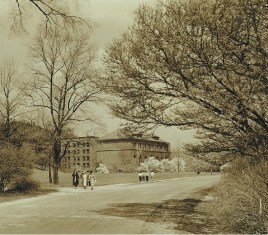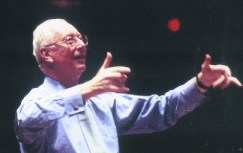
Landscaping Transplanted
The Radcliffe Institute's seminar program in landscape design and landscape design history (www.radcliffe.edu/landscape/index.html) will be based at the Arnold Arboretum in Boston's Jamaica Plain (www.arboretum.harvard.edu), effective July 1. As Radcliffe effects its transformation into an institute for advanced study (see "Radcliffe Ramps Up," September-October 2001, page 58), it is shedding activities not closely related to its fellowships. The publishing program previously relocated to New York, where it could take advantage of the professional expertise at its new home, the Columbia Graduate School of Journalism. In moving to the Arboretum, which already offers continuing-education programs in horticulture and design, the landscape courses would seem to have found a similar partner. Through the 2002-2003 academic year, courses will be conducted in Cambridge, while the Arboretum investigates possible new venues. Above: learning about plants at the Arboretum in the 1930s.
Interim Divinity Dean
 |
| William A. Graham Jr. |
| Stephanie Mitchell / Harvard News Office |
Pending a permanent appointment, President Lawrence H. Summers in December named William A. Graham Jr. acting dean of Harvard Divinity School. The position was vacated at the end of the year when Father J. Bryan Hehir stepped down to become president of Catholic Charities USA (see "A Divinity Activist," November-December 2001, page 76). Graham, who is Albertson professor of Middle Eastern studies in the Faculty of Arts and Sciences (FAS), has been a member of Harvard's faculty since 1973. A schol- ar of Islamic religious history, he currently chairs the department of Near Eastern languages and civilizations and serves as master of Currier House. He is also a member (and former chair) of the committee on the study of religion, which administers doctoral programs for FAS and the Divinity School, and of the undergraduate concentration in the comparative study of religion. Summers cited Graham as "an outstanding scholar, teacher, and talented administrator whose judgment and effective leadership style win wide admiration and praise." Noting his nearly 30 years of work with Divinity School faculty members and students, Graham welcomed the chance to "collaborate with colleagues within the school and across the University to maintain momentum."
Hospital Doctor
 |
| Paul F. Levy |
| Harvard Medical School |
Facing severe financial problems (see "Unhealthy Hospitals," March-April 2001, page 29, and "Hospital Rx," November-December 2001, page 81), Beth Israel Deaconess Medical Center, in Boston, has chosen Paul F. Levy as its new president and chief executive officer. Levy had been executive dean for administration and executive vice president of Harvard Medical School, which relies on Beth Israel Deaconess for clinical training for one-third of its students. The school's dean, Joseph B. Martin, cochaired the search committee that selected Levy. The medical center, which has struggled to integrate a 1996 merger of two premier hospitals and remains a key center of Harvard-affiliated research, has hired a consultant to advise on fiscal measures. Remedial actions will include substantial layoffs, and possibly the termination of some services, real-estate dispositions, and cutbacks in the center's research program.
Astronomical Finance
Observatory Hill sky-gazers startled in December when the federal Office of Management and Budget (OMB) floated a proposal to remove three scientific research centers, including the Harvard-Smithsonian Center for Astrophysics, from the auspices of the Smithsonian Institution. President George W. Bush's fiscal 2003 budget aimed to move these centers to the National Science Foundation (NSF), which awards grants for scientific research. The three research hubs, which also include a tropical research institute and an environmental center, receive a total of $35 million annually in core support, largely for staff salaries and maintenance of buildings; OMB wanted to transfer this core support to the NSF--possibly crippling the daily operations of the astrophysical center, whose staff constitute the world's largest center for astronomical research. But after strong protests from Congress and the scientific community, the proposal was withdrawn later in the month.
Popular Publications
In a year when readers thirsted for knowledge to cope with a bewildering world, Harvard University Press's surprise bestseller was Making the Most of College, by professor of education Richard J. Light, with 53,000 copies in print (see "The Storyteller," profiling Light's research, January-February 2001, page 32). All the other leading titles had some connection to terrorism and international affairs: the paperback edition of Michael Hardt and Antonio Negri's Empire, on globalization (40,000 copies); Kennedy School lecturer Jessica E. Stern's The Ultimate Terrorists (see "Understanding Terrorism," January-February 2002, page 36); Harold James's The End of Globalization; Pauline Boss's Ambiguous Loss: Learning to Cope with Unresolved Grief; and The Muslim Jesus, edited by Tarif Khalidi. Other sales were depressed by the terrorist attacks and the weak economy, reports director William P. Sisler. He notes that Harvard and other university presses have posted a bibliography, "Books for Understanding," on terrorism and international issues at aaupnet.org.
In Memoriam
 |
| Don C. Wiley |
| Harvard News Office |
Structural biologist Don C. Wiley, Loeb professor of biochemistry and biophysics, was reported missing November 16 after his empty rental car was found on a bridge spanning the Mississippi River, following a scientific board meeting in Memphis. His body was recovered 320 miles down river on December 20. Although speculation about the cause of death was fueled by his work on several virulent viruses, the medical examiner's autopsy report, released January 14, concluded that Wiley had been accidentally swept from the bridge after he got out of his car to inspect damage from colliding with construction signs. Noted for his work on the mechanisms of viral infection and immunity, Wiley was a Howard Hughes Medical Institute investigator and co-winner, with Jack L. Strominger, Higgins professor of biochemistry, of both the Lasker Medical Research Award and the Japan Prize....L. Anthony Sutin, J.D. '84, dean of Appalachian School of Law, in Grundy, Virginia, was among three people killed January 16 when a disturbed adult student went on a shooting spree shortly after being suspended from the school....Philosopher Robert Nozick, Pellegrino University Professor and senior fellow of the Society of Fellows, died January 23. He had been diagnosed with stomach cancer in 1994. An eclectic thinker and teacher, he was best known for Anarchy, State, and Utopia, published in 1974 and considered the libertarian alternative to A Theory of Justice, by Conant University Professor emeritus John Rawls.
Nota Bene
Design director. Toshiko Mori, who has been professor in practice of architecture and has taught at the Graduate School of Design since 1995, has been appointed chair of the department of architecture and Hubbard professor in practice of architecture. She succeeds Jorge Silvetti, Robinson professor in architecture, as department chair.
 |
| William L. Christie |
| Courtesy Arts First |
Baroque booster. The 2002 Arts First medalist, who will be recognized during the tenth-anniversary run of the spring festival, from May 2 through May 5, will be renowned harpsichordist and conductor William L. Christie '66, founder of the Baroque music ensemble Les Arts Florissants.
Bioethics advisers. Among the 18 members of President Bush's Council on Bioethics, named January 16, are Mary Ann Glendon, Hand professor of law, and Michael J. Sandel, professor of government and Harvard College Professor. They will advise on issues such as research involving stem cells and human cloning.
Catalan citation. Catalonia, Spain, conferred the Creu de Sant Jordi award on Thomas N. Bisson, Lea professor of medieval history, in Barcelona in December. He was recognized for his studies of medieval governance and civilizations in Catalonia and southern France.
Allston-Brighton connection. Another piece of the University's ambitious assembly of land for future development in Allston came closer to fruition, as WGBH report-edly agreed to relocate its studios and offices (on a site leased from Harvard) to Brighton Landing. That would free central parcels adjoining and across Western Avenue from the Business School campus, in the heart of the properties Harvard hopes to convert to academic use in coming decades.
Humanities orator. Henry Louis Gates Jr., DuBois professor of the humanities and chair of the department of Afro-American studies, will deliver the National Endowment for the Humanities' Jefferson Lecture--the federal government's highest individual honor for humanities scholars--in Washington, D.C., on March 22.
Peripatetic police. Harvard University Police Department headquarters moved February 1 from 29 Garden Street, between Cambridge Common and the Quadrangle residential Houses, to a University-owned office building at 1033 Massachusetts Avenue, a couple of blocks east of the main Cambridge campus. HUPD will maintain a substation at its old location; that building is being renovated.





